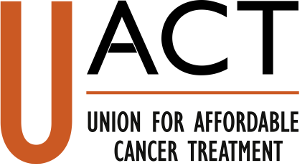On November 6, 2017, UACT sent a letter to the US Congress, supporting legislation to permit the United States to negotiate prices for drugs reimbursed by the Medicare program, but also ask the Congress to include language on compulsory licensing of patents, in order to ensure that when there is a dispute over the price, the monopoly is put at risk, rather than the patient. The letter also asks Congress to enact measures to enhance the transparency of R&D costs and drug manufacturing know-how, and under feasibility studies of delinkage.
A copy of the letter is available as a PDF, here , and reads as follows:
November 6, 2017
Dear Member of Congress,
Regarding Medicare negotiations and drug prices
The Union for Affordable Cancer Treatment (UACT) is a union of people affected by cancer who are committed to increasing access to effective cancer treatment and care. We are particularly concerned about the rapidly escalating cost of cancer medication and we believe that cancer medicines and other essential medical technologies such as diagnostic tools should be affordable.
UACT is a patient group that does not receive funding from drug companies.
UACT strongly supports repealing the current restriction on the federal government’s ability to negotiate drug prices for Medicare.
The lack of price negotiations by Medicare has distorted the prices of cancer drugs worldwide. Companies know that Medicare will reimburse extremely high prices. The problems in the Medicare program influence prices in the non-Medicare market in the United States, as well as in other countries.
While UACT strongly supports the notion of price negotiations for Medicare, we are also concerned that such negotiations may result in barriers to access for cancer patients, unless the government has sufficient leverage on prices. Without sufficient leverage, UACT is concerned that the government may then resort to access-limiting restrictions on reimbursements.
Congress should ensure that the Department of Health and Human Services has a good statutory framework for allowing the non-voluntary use of drug patents, and has sufficient exceptions to any non-patent intellectual property or regulatory exclusivities, when negotiations over reasonable prices reach an impasse.
The existing legal framework for compulsory licensing of patents are inadequate and the U.S. lacks sufficient exceptions to regulatory monopolies such as test data exclusivity or orphan drug exclusivity, for cases when prices are excessive.
We recommend that any legislation to authorize Medicare price negotiations include language that would ensure that when there is a dispute over the price, the monopoly is put at risk, rather than the patient.
The following is an example of language that would enhance the negotiating power of the federal government and protect patient access during price negotiations.[1]
Remedy for excessive prices
The Secretary of the Department of Health and Human Services or a designee authorized by the Secretary may limit the remedies for infringement of any patent to payment of a reasonable royalty, and create an exception for any regulatory exclusivity, when such action is necessary in order to enable the competitive supply of any drug, vaccine, medical procedure or diagnostic test that is not available at a reasonable price. The Secretary shall adopt the appropriate rules and procedures to carry out this section.
Other measures that will enhance the ability to negotiate reasonable prices include those that would ensure greater transparency, including in particular the costs of each clinical trial used to support the FDA registration or expanded approval of a product, and the value of public sector and charitable funding and subsidies for the development of a product, including the value of the orphan drug tax credit. It would also be helpful to require companies to disclose the know-how to manufacture approved products, so when legal monopolies expire, there will be more robust and timely competition from suppliers of safe and affordable generic and biosimilar versions.
Finally, Congress should act favorably on proposals to undertake feasibility studies of more radical changes in the business model for drug development that fully delink research and development costs from product prices. With delinkage, price-based formularies for drugs and vaccines can become a thing of the past, and the relationship between a doctor and patient can be focused on the treatments that are medically appropriate, and not be distorted by monopoly prices.
Sincerely,
Manon Anne Ress, PhD. Cancer patient, and Co-founder and acting Director, Union for Affordable Cancer Treatment
Kirsten Myhr, MScPharm, Cancer patient, and member of the Board of Directors, UACT
Ruth Lopert, MD, MMedSc, FAFPHM, Member of Expert Advisory Board, UACT
Clare Love, Cancer patient, and member of UACT
Michael Davis, Cancer patient, and member of UACT
Tido von Schoen-Angerer, MD, Cancer patient, and member of UACT
Megan Ciarfalia , Cancer patient, and member of UACT
Coralie DeTomassi, Cancer patient, and member of UACT
Endnote
[1] The language proposed is consistent with the US obligations under the WTO TRIPS agreement, and in particular, Article 44.2, which allows a remedies for infringement to be limited to compensation for using patents, and also Articles 7, 8 and 40, which acknowledge the need to control anticompetitive practices, such as excessive prices, and the 2001 WTO Doha Declaration on TRIPS and public health, which obligates governments to implement patent laws “in a manner supportive of WTO members’ right to protect public health and, in particular, to promote access to medicines for all.”
Attachment:
